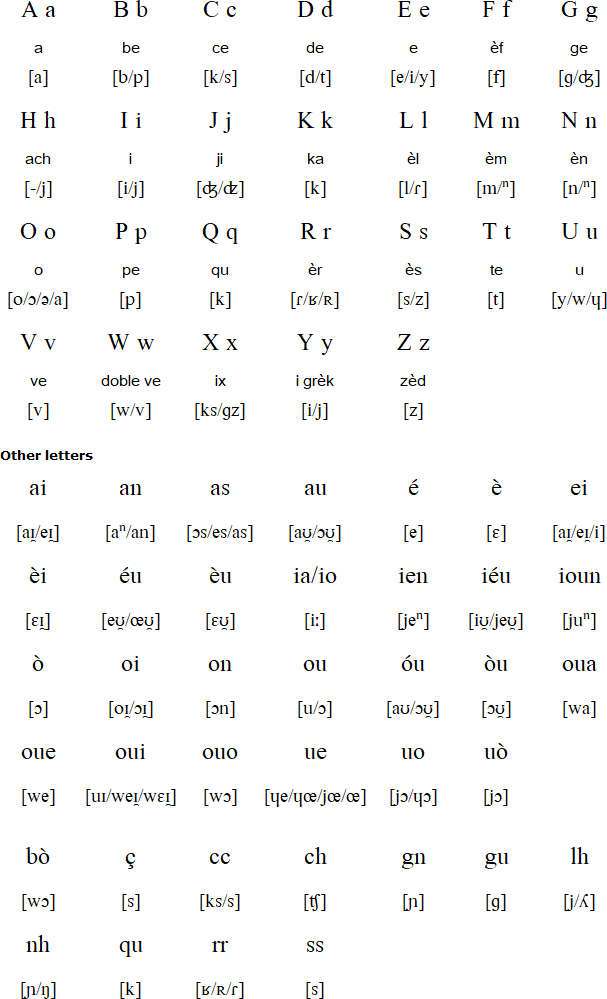Provençal is a variety of Occitan spoken mainly in Provence in the southeast of France by about 200,000 people. It is spoken particularly in the departments of Alpes-Maritimes, Bouches-du-Rhône, Var, Vaucluse, Alpes-de-Haute-Provence, and Gard.
Since the beginning of the 20th century the number of speakers of Provençal has declined as many parents do not to pass the language on to their children. As a result, most speakers are older adults. However, some children do learn the language at home and/or in school, and some schools teach bilingually in French and Provençal.
There are three main types of Provençal:
Provençal should not to be confused with Franco-Provençal (Arpetan), a Gallo-Romance language spoken in parts of northwest Italy, east central France and western Switzerland.
Provençal was the language used by troubadours and in literature from the 11th century. From the 13th century it was used in legal, administrative and other documents, and in courts. Its use for official purposes started to decline in the 16th century, and it was replaced by French as an official language after the French Revolution at the end of the 18th century.
In the late 19th century a number of people started to standardize written Provençal, including Simon-Jude Honnorat. In the early 20th century the Provençal writer, Frédéric Mistral, developed a new orthography for Provençal which is known as Mistralian.

Download an alphabet chart for Provençal (Excel)
Information about the Provençal alphabet supplied by Wolfram Siegel
Tóuti li persouno naisson liéuro e egalo en dignita e en dre. Soun doutado de rasoun e de counsciènci e li fau agi entre éli em' un esperit de freiresso.
Totei lei personas naisson liuras e egalas en dignitat e en drech. Son dotadas de rason e de consciéncia e li cau agir entre elei amb un esperit de frairesa.
Touti li persouna naisson lib(e)ri e egali en dignità e en drech. Soun doutadi de rasoun e de counsciència e li cau agì entre eli em' un esperit de fratelança.
Toti li personas naisson liuri e egali en dignitat e en drech. Son dotadi de rason e de consciéncia e li cau agir entre eli emb un esperit de frairesa.
All human beings are born free and equal in dignity and rights. They are endowed with reason and conscience and should act towards one another in a spirit of brotherhood.
(Article 1 of the Universal Declaration of Human Rights)
Information about Provençal | Numbers
Information about Provençal
https://en.wikipedia.org/wiki/Provençal_dialect
https://fr.wikipedia.org/wiki/Provençal
https://it.wikipedia.org/wiki/Dialetto_provenzale
http://www.endangeredlanguages.com/lang/8629
Aragonese, Aranese, Aromanian, Asturian, Catalan, Corsican, Dalmatian, Emilian-Romagnol, Extremaduran, Fala, Franco-Provençal, French, Friulian, Galician, Gallo, Gascon, Genoese, Guernésiais, Istro-Romanian, Istriot, Italian, Jèrriais, Ladino, Ladin, Ligurian, Lombard, Lorrain, Megleno-Romanian, Mirandese, Moldovan, Monégasque, Mozarabic, Neapolitan, Occitan, Occitan (Auvergnat), Occitan (Languedocien), Occitan (Limousin), Occitan (Provençal), Picard, Piedmontese, Portuguese, Romanian, Romansh, Sardinian, Sicilian, Spanish, Valencian, Venetian, Walloon
Languages written with the Latin alphabet
Page created: 06.09.21. Last modified: 07.09.21
[top]
You can support this site by Buying Me A Coffee, and if you like what you see on this page, you can use the buttons below to share it with people you know.

If you like this site and find it useful, you can support it by making a donation via PayPal or Patreon, or by contributing in other ways. Omniglot is how I make my living.
Note: all links on this site to Amazon.com, Amazon.co.uk
and Amazon.fr
are affiliate links. This means I earn a commission if you click on any of them and buy something. So by clicking on these links you can help to support this site.
[top]